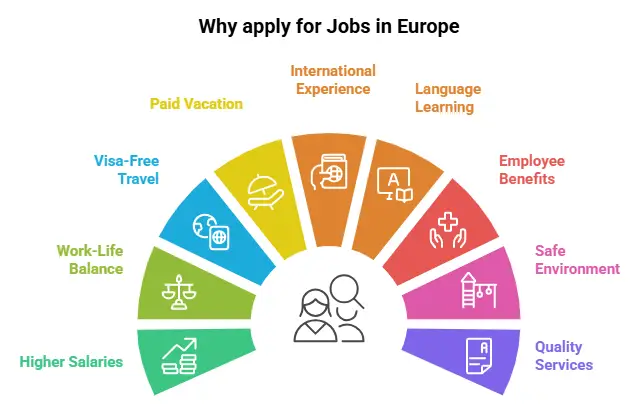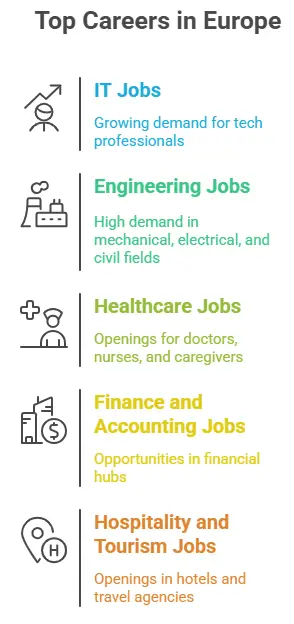Highest Paying Job Opportunities in Europe
Europe has many high-paying jobs for skilled Indians in IT, engineering, finance, and healthcare. Job vacancies in Europe reached around 2.5%, showing high demand for professionals. Countries like Germany, Netherlands, Italy and Sweden have millions of openings, especially in tech and engineering. Professionals in Europe earn between €50,000 and €90,000 a year on average, depending on their skills and country, which is much higher than salaries offered for similar roles in India. Many Indian professionals are moving to Europe for better pay, career growth, and international experience. With skill shortages and high demand, Europe offers excellent opportunities for Indians to build successful global careers.
Some of the highest paying job in Europe are listed below:
|
Occupation |
Average annual salary |
|
IT and Software |
€110,000 |
|
Engineering |
€95,000 |
|
Accounting and Finance |
€100,000 |
|
Human Resource Management |
€70,000 |
|
Hospitality |
€68,000 |
|
Sales and Marketing |
€66,028 |
|
Healthcare |
€120,000 |
|
STEM |
€135,000 |
|
Teaching |
€85,000 |
|
Nursing |
€100,000 |
Source: Talent site
Why apply for Jobs in Europe?
- Higher salaries when compared to India
- Better work-life balance
- Travel within the continent without a visa
- Enjoy paid vacation once every year
- Opportunity to learn foreign languages
- Strong employee benefits and social security in many countries
- Safe and secure living environment
- Access to quality healthcare and education in most European nations

Job Openings in Europe
Europe has great job opportunities for people from outside the EU. Some countries offer good pay, plenty of jobs, and a healthy work-life balance. The table below shows the best countries to work, the number of job vacancies in Europe:
|
Country |
Approximate Job Vacancies |
Benefits of Working |
|
Germany |
1,000,000+ |
Largest EU economy, high demand for skilled workers, strong industrial base |
|
United Kingdom |
750,000+ |
Diverse job opportunities, strong economy, English-speaking environment |
|
France |
500,000+ |
Strong economy, good work-life balance, vibrant culture |
|
Netherlands |
210,000+ |
High English proficiency, vibrant tech scene, excellent infrastructure |
|
Austria |
29,000+ |
High quality of life, good work-life balance, strong social welfare |
|
Italy |
1,000,000+ by 2030 |
Rich culture, growing job market, opportunities in manufacturing and IT |
|
Luxembourg |
6,867 |
High wages, strong finance sector, multilingual environment |
|
Finland |
28,900 |
High quality of life, excellent education, good work-life balance |
|
Portugal |
57,357 |
Growing tech and tourism sectors, lower cost of living |
|
Spain |
23,984+ |
Growing economy, lower cost of living |
|
Malta |
9,158 |
Strong demand in healthcare, IT, and professional services; English-speaking environment |
How to find Jobs in Europe from India?
Follow these steps to find a Job in Europe:
Step 1: Choose a country and job sector where your skills are in demand.
Step 2: Prepare a European-style CV and cover letter highlighting your experience.
Step 3: Search for job openings on trusted job portals, company websites, and visa-sponsoring employers.
Step 4: Apply for jobs online and keep track of your applications.
Step 5: Prepare and attend interviews with companies, online or in-person.
Step 6: Receive a job offer that meets visa or work permit requirements.
Step 7: Apply for the correct work visa or permit with all necessary documents.
Step 8: Move to the country, register locally if needed, and start working legally.
Top Careers in Europe
IT Jobs in Europe
Europe’s tech industry is growing fast, creating strong demand for IT professionals. Over 30% of companies in the EU plan to hire more tech workers this year. Skilled professionals in software development, cybersecurity, cloud computing, and AI have excellent opportunities.
According to Robert Half, top roles include .NET developers, IT project managers, and IT operations managers. Job growth in Europe’s IT sector is five times higher than in other industries, and salaries continue to rise steadily.
Engineering Jobs in Europe
Engineering professionals are highly sought after across Europe, especially in mechanical, electrical, civil, and chemical fields. Germany leads the continent with huge demand for engineers, thanks to its strong industrial and manufacturing base. Other countries like France, Spain, and the Netherlands also provide attractive job opportunities and competitive pay for skilled engineers.
Healthcare Jobs in Europe
Europe’s healthcare sector offers thousands of openings for doctors, nurses, physiotherapists, and medical technicians. An ageing population and increasing healthcare needs have boosted demand for caregivers, home health aides, and specialists in elderly and rehabilitation care.
Countries such as Germany, Ireland, and the Netherlands are actively hiring international healthcare professionals to fill skill gaps.
Finance and Accounting Jobs in Europe
Europe has a strong financial sector that offers rewarding opportunities for accountants, auditors, analysts, and banking professionals. Cities like London, Frankfurt, Zurich, and Luxembourg are major financial hubs offering high salaries and international exposure.
With growing demand for professionals skilled in financial planning, risk management, and compliance, Indian finance experts have excellent career prospects in Europe.
Hospitality and Tourism Jobs in Europe
Europe’s tourism and hospitality industry continues to thrive, with openings in hotels, restaurants, travel agencies, and event management. Countries like Spain, Italy, France, and Portugal have a constant need for chefs, hotel managers, front-office staff, and tour guides.
This sector offers flexible working options, good earnings, and a chance to work in some of the world’s most popular tourist destinations.

Migrate with a European work visa
A Europe Work Visa allows foreign professionals to live and work legally in European countries for a specific period. It is issued to individuals who have a job offer from an employer in a European nation. With this visa, you can enter the country, work for your employer, and enjoy employment benefits similar to local workers.
Each country in Europe has its own work visa rules and types, such as the EU Blue Card, Skilled Worker Visa, or Temporary Work Permit. These visas are mainly for skilled professionals in fields like IT, engineering, healthcare, finance, and education.
It’s best to apply at least 2 months before your joining date, as embassies usually take 6 to 12 weeks to process the visa. A Europe work visa is generally valid for one year, and you can extend or renew it as long as you have a valid job offer and meet the country’s requirements.
Europe Work Permit
The visa requirements in Europe are different for EU and non-EU citizens. If you belong to a country that is part of the EU, then there are no restrictions, and you can work in any EU country without a work visa. However, if you are not a citizen of any EU country, you should get a work visa to search for a job and work in any European country.
Types of Work Permits in Europe
In Europe, non-EU citizens need a work permit to live and work legally. The type of visa depends on the country you are working, kind of job, the duration of work, and the applicant’s skills. Here are the main types of work permits in Europe:
- Temporary Work Permit: For short-term or contract-based jobs, usually valid for a few months to a year.
- Permanent Work Permit: For foreign workers who have lived and worked in an EU country for several years and want to settle permanently.
- Seasonal Work Permit: For people working in seasonal jobs like farming, hospitality, or tourism.
- Intra-Company Transfer Permit: For employees of international companies who are transferred to an office in another EU country.
- Freelancer or Self-Employment Permit: For people who work for themselves or run their own business in Europe.
- Research or Academic Work Permit: For researchers, scientists, or teachers working in educational or research institutions.
EU Blue Card
The EU Blue Card is a visa that allows skilled professionals from non-EU countries to live and work in Europe. It gives benefits like easy travel within the EU, bringing family members, and a chance to get permanent residency. To apply, you need a university degree, job offers, and a salary that meets the country’s rules.
The card is available in 25 EU countries, but Denmark and Ireland do not take part in the EU Blue Card program. It is valid for up to four years, depending on your job contract. After working for 18 months, you can move to another EU country with an EU Blue Card. Holders also enjoy equal work and social rights as citizens. It helps fill Europe’s skill gaps, especially in IT, engineering, healthcare, and research fields.
Requirements for Europe work visa
The visa requirements in Europe are different for EU and non-EU citizens. If you belong to a country that is part of the EU, then there are no restrictions, and you can work in any EU country without a work visa. However, if you are not a citizen of any EU country, you should get a work visa to search for a job and work in any European country.
To obtain a work visa in Europe, the following requirements are needed:
- Valid passport
- Completed Application form
- Two passport-sized photographs
- Travel health insurance
- Proof of accommodation
- A job offer letter from an employer in the EU
- Proof of academic qualifications
- Proof of proficiency in the local language
- Health and conduct certificates
- Applying through online job portals
Work Visa and Residence Permit
Research indicates that the sectors with the most job opportunities are IT, healthcare and construction. There is a demand for technical professionals as well. People with a STEM background and qualified doctors and nurses have better chances of finding a job here. The jobs in Europe for Indians can be found in these sectors.
The best thing is to keep an open mind and look for openings in Europe that can turn into a career. It is one of the golden rules that any person should follow if they are willing to work in the EU. Having a preferred option of jobs cannot help you get the dream job you want. Instead, try to find choices that will help you get your desired option for jobs. You need to keep an open mind and your own self-set standards and restrictions should not be followed.
Steps to Apply for a Work Visa in Europe
Step 1: Choose Your Country you want to work in
Step 2: Ensure you meet the country’s requirements
Step 3: Apply for jobs through online portals, company websites, or recruitment agencies, and
Step 4: Secure a confirmed job offer from an employer.
Step 5: Gather your passport and other required documents.
Step 6: Apply at the embassy, consulate, or online portal of the country where you will work
Step 7: Attend an Interview if required
Step 8: Wait for Visa Approval
Step 9: Once approved, travel to the country, register with local authorities if needed, and start your job legally.
How can Y-Axis assist you?
Y-Axis is the best route to get to work in Europe. Our services include
- Expert Guidance & Counseling
- Job search services to find a job in Europe.
- Resume writing, marketing, LinkedIn marketing, and resume zapping to make your profile stand out to top European companies and increase your chances of getting the right job.
- Guidance on preparing applications
- Coaching Services: IELTS/TOEFL and German coaching to meet language requirements for European jobs.
- End-to-End Career Support
- For free Career Counseling book your session today
Looking for Inspiration
Explore what Global Indians have to say about Y-Axis in shaping their future
Frequently Asked Questions
